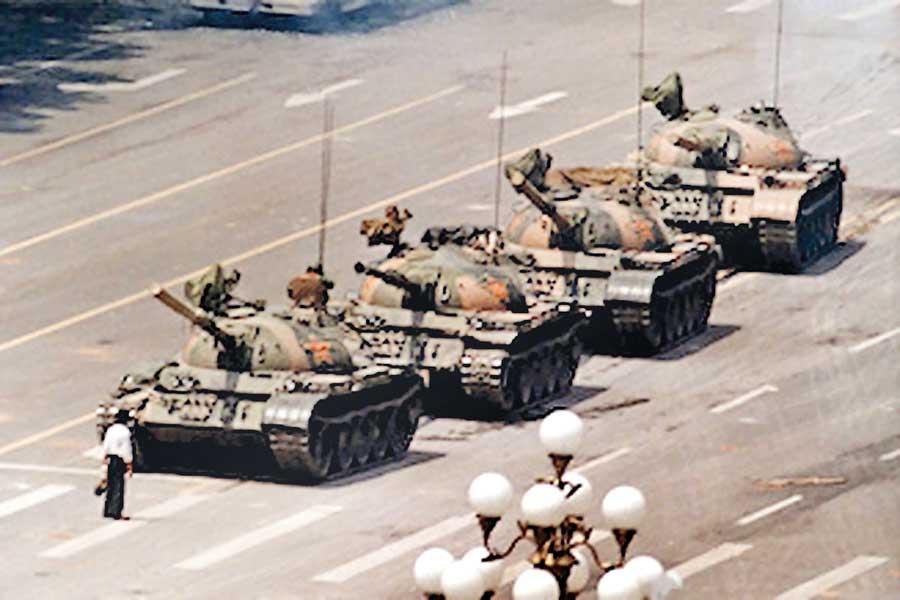Reply To:
Name - Reply Comment
As we emerge from two-and-half years on pandemic driven restrictions, we will be adjusting to a new information order

Tank Man - the nickname of an unidentified Chinese man who stood in front of a column of tanks leaving Tiananmen Square in Beijing on June 5, 1989.
Every conflict throws up lasting images. Like the Tankman of Tiananmen Square. We still don’t know who the lanky man was or what happened to him after his brave stand. But that image of him standing in front of a row of tanks is indelibly etched in our memories.
the lanky man was or what happened to him after his brave stand. But that image of him standing in front of a row of tanks is indelibly etched in our memories.
The conflict in Ukraine has already generated many such images. The profanity-laden reaction of the sailors stationed in Skull Island faced a deadly threat of a bombing spree. Or that of Mr. McAdams? Thousands of miles from the theatre of conflict, but still, immortal.
Mr. McAdams became an internet sensation last week when an Indian TV host berated him in schoolmaster like tones only to later be reminded by poor Mr McAdam, she had not uttered a word before the tirade. Part of the conversation went thus
“Dear host, I have not said a word yet, I don’t know why you are yelling at me.”
“I am not yelling at you, I am talking about Mr. McAdams.”
“I am Mr. McAdams!”
Without the net though McAdams may not have attained such popularity.
The difference now is that these images are coming thick and fast and they are not static. They are interactive and they become social events because they gain a life of their own online.
Mr. McAdams became a viral sensation after the exchange that the channel and the host invited him back. He was, by all means, that rare phenomenon of utter virality before uttering a word.
Remember the last time, powerful Ministers quit a Government in Sri Lanka?November 21, 2014, when Maithripala Sirisena launched his successful campaign. Then at least one national TV channel beamed the press conference live.
"As developers of information packages, journalists will have to achieve a balance between the virtual and the real-time. Nothing, nothing, can replace the role of journalism as an observer, first-hand observer"
Come last week when a similar event took place, the organizers beamed it live on Facebook. Public reactions were coming in at the same time as the defections were taking place.
Social media now plays an integral part of our lives. When the death of Shane Warne broke here in Victoria, the reactions from fans, friends and others came on social media. Warne’s last Instagram and Twitter post now appear haunting.
We used to be told that history’s first draft is Journalism. Now, it is social media. And like any draft, the one who makes the first draft needs scrutiny. Fake news is not a modern invention. It has been around since the time humans began to communicate. The difference now is that so many have the chance to make this draft of history, adjust it in so many ways and send it out to the world. They now also have the option to artificially boost these.
Know why the vaccination rates in Ukraine are so low? That is how effective Russian misinformation campaigns have been.
"Social media now plays an integral part of our lives. When the death of Shane Warne broke here in Victoria, the reactions from fans, friends and others came on social media. Warne’s last Instagram and Twitter post now appear haunting"
Laying the groundwork for any public campaign now entails a social media reliant digital component.
As we emerge from two-and-half years on pandemic driven restrictions, we will be adjusting to a new information order-an order where the digital has surpassed legacy media as the most influential public relations tool.
I can’t recall the last time I wrote something that did not first go digital. Even this column, I read it first online. My interviews are now online, and that is not going to change, because all of us now find Zoom or Meets that much more flexible and easier.
As developers of information packages, journalists will have to achieve a balance between the virtual and the real-time. Nothing, nothing, can replace the role of journalism as an observer, first-hand observer.
Journalism and all of us would have to be prepared that we now inhabit a perpetual electric storm of truths, half-truths and fakes, crashing into each other like charged atoms.
The writer is a journalism researcher and a writer. He can be contacted on amantha.perera
@cqumail.com